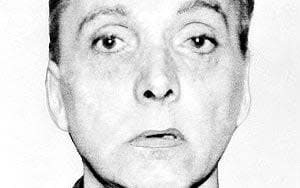Ian Brady had locked briefcases of his belongings taken away hours before his death, inquest hears

Locked briefcases belonging to Moors Murderer Ian Brady were removed from his hospital room hours before his death, an inquest heard.
The serial killer's bags were sealed by staff and locked in the director of security's office at Ashworth High Secure Hospital, a coroner was told on Thursday.
Brady's will, made in 2011, is reported to have contained instructions that two briefcases full of Brady's legal and personal papers - and his other belongings - were to be collected immediately after his death.
There was ongoing evidence of intractable narcissism with marked grandiosity, a lack of empathy, demanding and entitled behaviour
Dr Noir Thomas
Following the 79-year-old's inquest, a spokesman for Mersey Care NHS Trust, which runs the Merseyside hospital, said Brady's possessions had been given to his lawyer Robin Makin, the executor of his will.
Meanwhile, the burial plans for Brady remain a mystery after the coroner concluded he died of natural causes.
Christopher Sumner, senior coroner for Sefton, ruled out neglect and self-neglect as contributing factors to the death of Brady at an inquest held at Bootle Town Hall, Merseyside.
Mr Sumner had previously refused to release the body of the killer, who died on May 15, until he was given assurances his ashes would not be spread on Saddleworth Moor, where the bodies of three of Brady's and Myra Hindley's five child victims were found.
Twelve-year-old victim Keith Bennett is also believed to have been buried on the moor, but his remains have never been found.

Brady's body was kept under police guard until it was released to Mr Makin on May 18, after he said there was "no likelihood" the ashes would be scattered on the moor.
But no reference was made to the murderer's remains at the inquest into his death on Thursday and Mr Makin did not attend the hearing.
A spokesman for the Liverpool-based solicitor's office said he was on religious holiday and would not be commenting.

The coroner's court heard the serial killer, also known as Ian Stewart-Brady, had asked for locked briefcases to be removed from his room at Ashworth High Secure Hospital hours before his death at 6.02pm.
Consultant forensic psychiatrist Dr Noir Thomas said that at 12.30pm on May 15 medics concluded Brady, who suffered from lung disease emphysema, was nearing death.
He said: "He asked for his solicitor to be notified and requested that his locked briefcases be removed from his room. These were sealed by security staff and locked in the director of security's office."
The inquest hearing, which lasted less than 45 minutes, heard Brady was diagnosed in 1985 with paranoid schizophrenia, marked by perceptual disturbances, delusional ideas, disorganised thought and speech.

Dr Thomas said: "His 32-year detention at Ashworth Hospital was largely marked by hostility, opposition to his care and treatment, allegations of brutality, serial complaints and insistence of interference by the Home Office."
The court heard Brady had been on intermittent hunger strike since 1999 and was fed by a nasogastric tube, but his feed was often coupled with an acceptance of diet and fluids from select staff.
The killer had "serially pursued" a move from Ashworth Hospital to prison - without success at various mental health tribunals - and had talked about committing suicide, the inquest heard.
Mr Thomas said: "In recent years there was ongoing evidence of intractable narcissism with marked grandiosity, a lack of empathy, demanding and entitled behaviour."
How Ian Brady and Myra Hindley's crimes shocked Britain
Home Office pathologist Dr Brian Rodgers said the cause of death was cor pulmonale, a form of heart failure, secondary to bronchopneumonia and chronic obstructive pulmonary disease, or lung disease.
The court heard Brady, who was a heavy smoker up until the smoking ban, had "very severely diseased" lungs.
Dr Rodgers said Brady was not emaciated, despite his intermittent hunger strikes, and weighed about nine stone.
Recording his verdict, Mr Sumner said: "The controversy surrounding this patient in life was markedly absent in death for reasons the pathologist has given."
He added: "He received appropriate medical care throughout his time as a patient at Ashworth Hospital to satisfy both his physical and his mental needs.
"I thus find there was no evidence of neglect or self-neglect contributing to the death of Mr Stewart-Brady."


 Yahoo News
Yahoo News 
